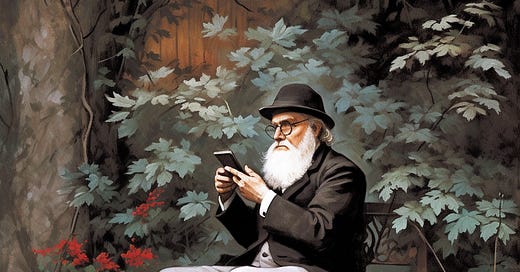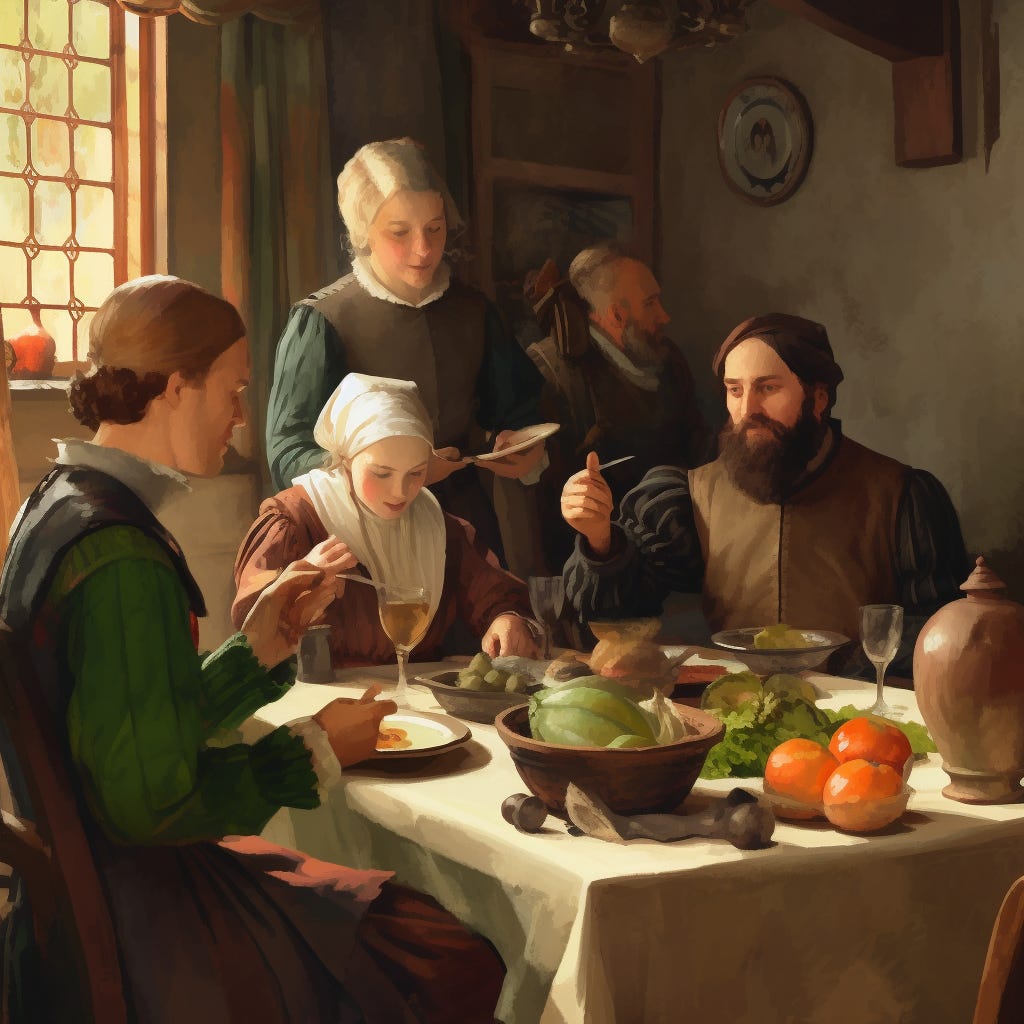While psychologists talk about people being “happy” or having “positive emotions,” economists talk about utility. Why does Pat want to buy that new television? Well, Pat derives utility from the TV, or thinks that she would. So Pat buys the TV and then enjoys—derives utility from, in econ-speak—watching it. To economists, goods and services are, roughly, a key source of happiness, though they use the language of utility to make even the discussion of happiness dull and lifeless.
Until about the eighteenth century, even royalty did not have regular access to indoor plumbing, and so they did their business in outhouses and chamber pots, with all the attending inconveniences, never mind aromas. The average Englishperson ate meat relatively rarely, as it was an expensive luxury. Perhaps most importantly, depending on the precise time and place, the English might have wished they were safer from attack and death, visited upon them by their countrymen—civil war, banditry, etc.—or those further afield—Vikings, the French, etc.
It is easy to imagine even the lords and ladies of the time fantasizing about a world in which they were (relatively) safe, had regular access to clean water, as much food as they wanted, and free or cheap access to all the published works of writing (for the half of the populace that was literate). These wistful nobles believed they would derive much utility from these imagined goods and services.
Modern Americans, with important exceptions, have access to all these and much, much more. One might think, then—especially if one were an economist—that if one’s happiness depended on having enough food, being comfortable, and being reasonably safe from attack—if these are, in fact, the source of utility—then Americans would be practically effervescent with joy, particularly compared to historical lords and ladies, who had to make do with so much less.
Paradoxically, despite all the creature comforts, some data suggests that Americans are suffering from anxiety and depression in greater numbers than ever.1
What, in short, gives? The world is filled with wonders prior generations could barely conceive of. Few Americans starve and, in fact, the bigger issue is obesity, too much food. If human happiness depended on goods and services, we should all be overcome with giddiness.
A fair bit of ink has been spilled on this question—some sources are in the Suggested Reading list, below—but the short answer/summary is that, yes, technology shoulders some of the blame but, really, it’s all evolution’s fault.
First, we have to replace the economist’s view of happiness and utility with the evolutionary view. More or less, emotions are there because they measured something useful and motivated appropriate – adaptive – actions. Fear measures threat and motivates fleeing, that sort of thing. (See Emotions Measure and Motivate.) Now, happiness is complicated, but, at the core, the pleasant emotions are evolution’s way of saying: yes, that was good, so whatever you did, do that again.
A big problem with happiness, however, is that fitness is competitive. If you do well at getting yourself fed, learning valuable skills, finding a mate, well, that’s great. But if everyone around you has done even better at those tasks, their genes are going to be around in the next generation in greater numbers than yours, and that’s that.
In short, many (but not all) of our evolved reward systems are comparative because fitness is comparative. Sure, in the land of the blind the one-eyed person is king, but in the land of the binocular vision people, the one-eyed person, sure, can see, but the fact is that they are half blind.
Simplifying tremendously, here is how happiness works. You look around, see how well you’re doing in comparison to others, and if you’re doing better than a lot of them, you feel good.2 Bully for you! Darwin is whispering in your ear, keep doing what you’re doing. If, on the other hand, you look around and other people have more stuff—money, experiences, friends, whatever—then, well, that’ll make you sad. Now Darwin is saying, you’re relatively behind others and if you don’t change it up, you’ll be a dead-end branch on the ol’ tree of life.
Of course, it’s not all relative. If you stub your toe, that hurts, and you’ll be sad for a minute. If you miss a few meals, you’ll be hungry, and that’s no fun. If your very basic needs aren’t being met, it’s just hard to be terribly positive. Happiness is, of course, complicated.3
Ok, now comes the real kicker: the communications age.
If one goes back far enough, tens of thousands of years, it’s unlikely that any of our ancestors knew how well more than a few hundred or perhaps thousands of other people were doing. Without modern communication and travel technologies, along with low population densities, people just didn’t know a lot of other people.
Along comes radio, television, the internet, facebook, Twitter and, blam, now you learn about all the wonderful things that are happening to other people. And, of course, on facebook, people are much more likely to post about their dreamy vacations, their dreamy spouse, and their new dream job, way more than they post about stubbing their toe, so it seems like everyone’s life is rainbows and unicorns. Your life is, well, fine, but everyone else is showing you their highlight reel and by comparison…
It's actually worse than that.
Evidence from psychology suggests that people naturally compare themselves not only to others around them, but also to themselves in the past. Some research—which might not hold up, since so little psychological research seems to hold up—implies that lottery winners are not that much happier than other people after some time has passed. Why might this be? It’s probably because our happiness depends on improvements rather than our state. So if you win the lottery, you may be doing great a year later, but not as great as you were just after the win. This has been referred to as the “hedonic treadmill” because you have to keep improving just to maintain the same level of happiness.
The other Living Fossils are better equipped to offer advice about how to navigate this vexing happiness puzzle evolution has built for us. But it seems to me that there are two sorts of remedies.
One is to take seriously the idea, with roots in Buddhism, that the cause of suffering is desire. The idea that desire plays an important role in suffering resonates with the evolutionary view. The circumstances that give rise to negative feelings are likely to be the ones in which our evolved needs are not being met. These negative feelings are in part the motivational system, designed to get you to satisfy these needs. The Buddhist cure attacks the problem at the root. Eliminate desire, eliminate suffering. Easier said than done, but spend a decade thinking about it and you can make some progress.
The second route, one that has to be acknowledged, is to beat everyone else. My sense is that this route isn’t frequently suggested to clients in the clinic, but it seems to me that there is at least some utility bump when people get what they are striving for. Anyone who has won a competition or an honor can attest to this. Here again, I’ll leave to the other Fossils the question of why clinicians don’t seem to favor counseling patients to try to surpass others to meet their desires, but my sense is that clinical psychology, broadly, doesn’t like to admit that life is competitive and zero-sum, having a more can’t-we-all-get-along vibe.
There’s probably something of a middle ground, something like you can’t always get what you want, but you might just get what you need or, perhaps, it’s not having what you want; it’s wanting what you’ve got.4 As Shani writes in another piece, it helps to have gratitude for what we have, even if we’ve had it for a while. If you don’t get too used to the good stuff—and you do take the time to appreciate it even when it’s familiar—that might help build a life with more happiness. And by “stuff” I include, and especially mean, people.
No doubt there are other techniques that are useful, and wiser minds than mine have set them down.5 “How can I maximize happiness?” is a tough question. My sense is that one piece of it is to resist constantly making comparisons to others. There are probably a few other pieces as well.
Generally, however, evolution is the thief of joy, working through comparisons with others as well as with oneself in the past. The trick is how to avoid the theft.
Knowing about it might help you slip out of evolution’s grip, and stop worrying about how everyone else is doing, since all that comparison is just natural selection’s way of manipulating you.
Further Reading
Pinker, S. (2012). The better angels of our nature: Why violence has declined. Penguin Books.
Wright, R. (2017). Why Buddhism is true: The science and philosophy of meditation and enlightenment. Simon and Schuster.
Putnam, R. D. (2000). Bowling alone: The collapse and revival of American community. Simon and Schuster.
Zak, P. (2022). Immersion: The Science of the Extraordinary and the Source of Happiness. Lioncrest.
Hunger and other motives aren’t comparative. If you’re full, you still feel sated even if someone else is more full. For this argument to work, it doesn’t need to be the case that all the reward systems are relative, just that some are.
See especially Why Buddhism is True by Robert Wright.
The Rolling Stones and Sheryl Crow, respectively





